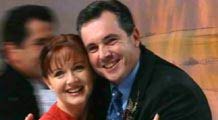|
.
Comment
> Losing
the Plot by
Stuart
 This
morning I spilt some milk. Before I had a chance to wipe it
up, this unlikely instrument of doom caused me to slip, bang
my head, and fall into regressive amnesia. Bugger. So the
year's now 1984 and I'm apparently typing this on a BBC Micro... This
morning I spilt some milk. Before I had a chance to wipe it
up, this unlikely instrument of doom caused me to slip, bang
my head, and fall into regressive amnesia. Bugger. So the
year's now 1984 and I'm apparently typing this on a BBC Micro...
Okay,
so I lied. Didn't believe me? Well yeah, that's the point.
Somehow, as Neighbours meandered through one of its
weakest seasons ever, some bright spark hit on the idea of
Susan befalling such a fate, and it's a direction that seems
fundamentally flawed.
Soap
opera is about journeys rather than destinations. In a world
of open-ended, overlapping plots and story devices, what makes
the format compelling is the identification of a character
taking a journey through their life, making decisions and
facing adversity the viewer can identify with, and emerging
changed by their journey at the other end. Sadly, the headline
Susan storyline seems to fail on every count.
Undoubtedly
Susan was in need of a major storyline, as were the Kennedy
family in general. But something so tabloid and plot-driven
was not the way to go. If soap opera is accepted as a character-based
format, then Karl and Susan's rapport is a crucial part. One
can place pressure on it, offer adversity, but the wholesale
dismantling of their dynamic ultimately cheats the audience
and the actors who have worked long and hard to build that
interplay.
If
Neighbours wanted to do a storyline about mental health,
one wonders why they didn't use Susan's job to lead to an
emotional breakdown, something achieving the same ends by
an altogether more satisfactory means. A breakdown would have
been directly identifiable with many of the audience (one
in three people will at some point in their lives suffer from
mental illness), with opportunities for social comment on
the workload of today's educators. Instead, we have a far-fetched,
ethereal tale that operates solely on one level, with no op
portunity to make broader comments about the lives of these
characters and the audience in general.
Soap
operas are open-ended—theoretically no storyline should
ever entirely end, as the format depends on reaction rather
than action. The use of the "reset
switch" to restore the previous status quo of a storyline
is the antithesis of the format. Yet the Susan story will
come to depend on that corruption of the form.
As
a linear story, soaps should also be plotted and structured
organically, yet the storyline also fails on that count. If
one views the ordinary "A to B" journey-style plotting
as an avenue, then this is a storylining dead end. Susan cannot
remain amnesiac, nor can "evolve" back convincingly
to her original state. Sooner or later, the reset option will
have to be used, especially with the added complication of
Drew's departure, which will require a unified Kennedy front
for Libby's sake. The only way one can finish is with a regressive
act, which is structurally unsatisfying. Such "magic"
restorations are the brittle promise of fairy-tales, not of
soaps supposedly grounded vaguely within the identifiable
world.
|

|
Karl
and Susan Kennedy are one of the few genuinely equal couples
Neighbours has ever produced. Both compliment the other
perfectly and no one performer dominates. It feels like a
genuine partnership, and that's what makes them compelling
to watch. By robbing Susan of her identity as it stands, an
inequality is introduced into the relationship, with Karl
now experiencing events on a wildly differing level of understanding
to his wife, losing the vital empathy between the characters.
Whether the relationship in its broader, functional sense
can survive this disruption remains to be seen.
Hopefully
at best the amnesia thread will provide a little variation
and zip in the usual mix, offering Jackie Woodburne some challenging
material along the way. However, few can deny that it marks
a new low in plausibility and threatens to do both long-term
damage to the show's format and the emotional dynamic of one
of its most successful partnerships.
Back
|

